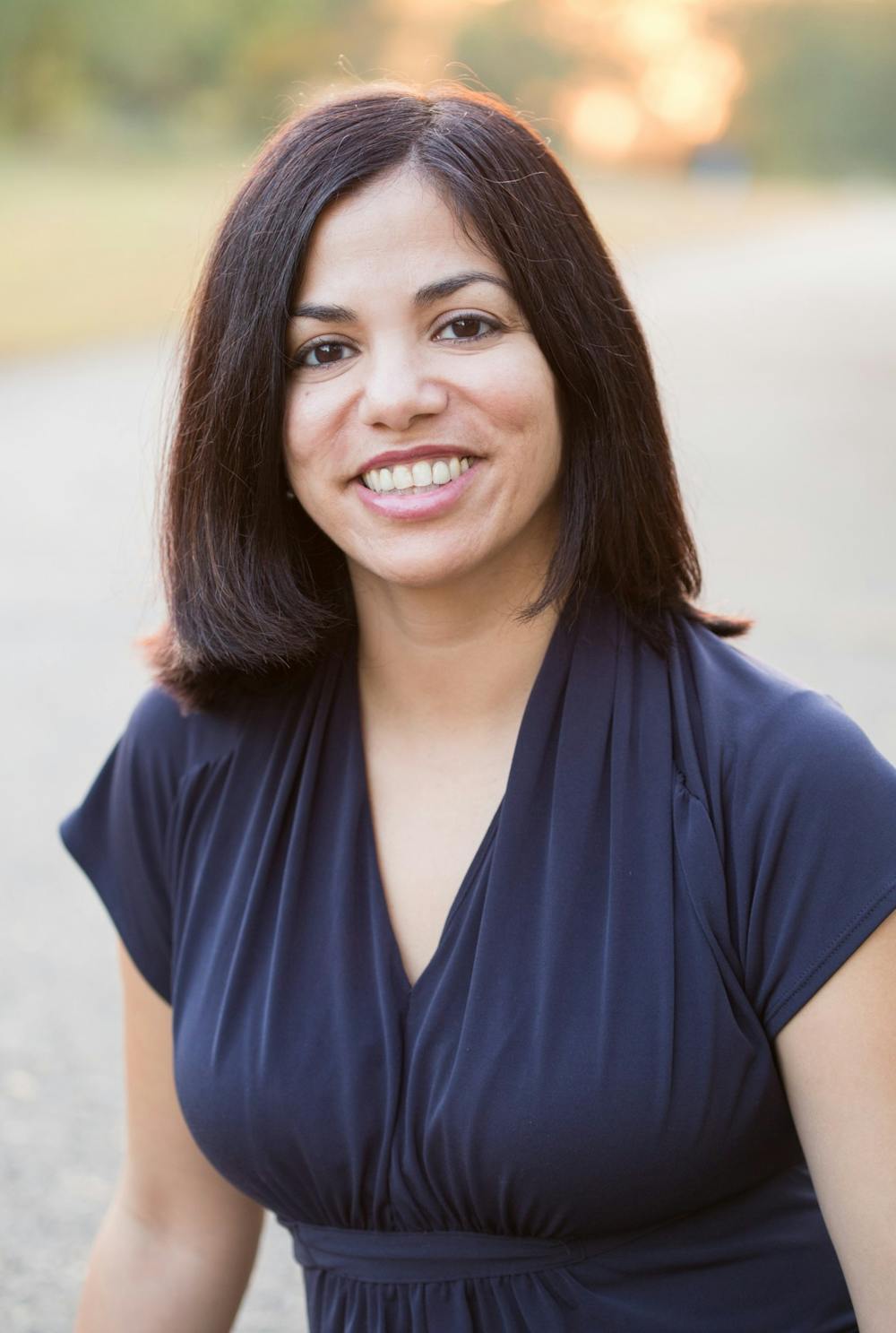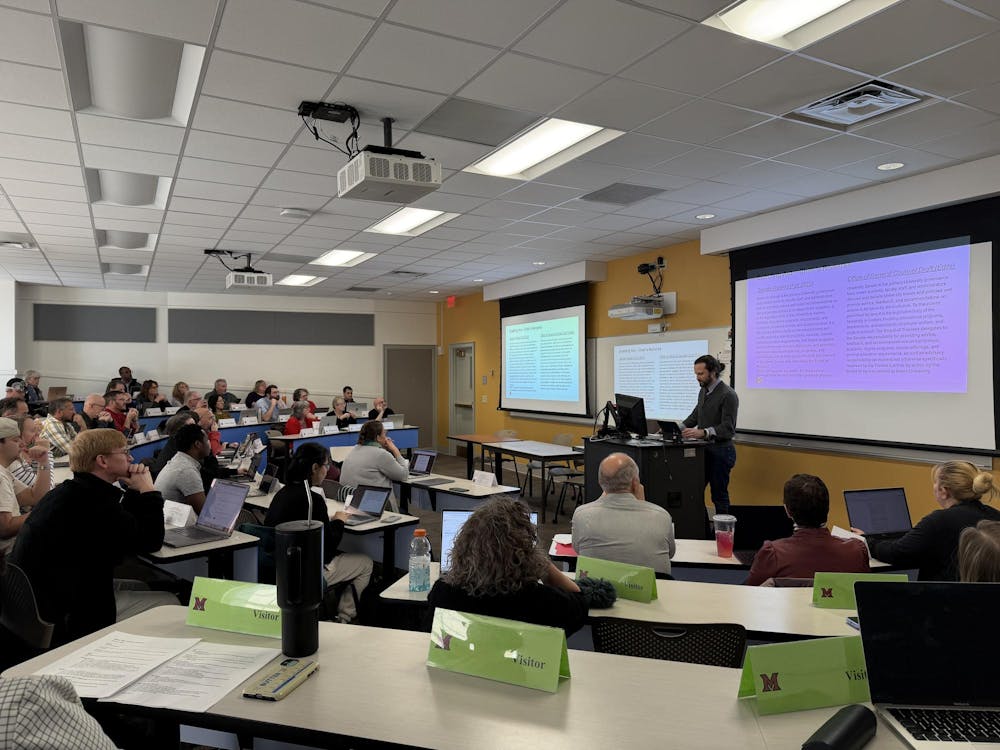Students who visit Daisy Hernández’s office in Bachelor Hall are immediately greeted with a collection of posters on the door.
One poster, “Yoga for Writers,” humorously connects English terms with yoga poses. Another reads, “We LOVE you and we HONOR you and we defend your right to be here.” Others advertise campus organizations such as Spectrum and Women Helping Women.
Three of the office’s walls are painted white, but a yellow one stands out. Hernández, an assistant professor of creative writing at Miami University, chose the color herself. A picture of June Jordan, a Black poet, hangs on the wall. Jordan wrote one of Hernández’s favorite poems, “Poem About My Rights.”
A bookshelf stands to the right, overflowing with literature. When talking about writers, a particular one stands out to Hernández: Sandra Cisneros.
“She’s a poet and her language is just so imagistic, so beautiful,” Hernández said. “She’s also Chicana, and she was writing in … mostly English, but she brings in Spanish and she was writing about her … immigrant community which is really different from mine, but there were points of similarities.”
An author as well as professor, Hernández’s most recent book, “The Kissing Bug,” which won the PEN/Jean Stein Book Award, is about Chagas disease, which is prominent in rural Latin American areas. For this book, Hernández had to pivot what she was reading from books to science articles, which required simplifying complex scientific concepts.
“When you’re writing about science or medicine, you’re basically doing translation work,” Hernández said. “How can I take this terminology, these concepts, and make them palpable for a general reader who doesn’t sit around reading science articles for fun?”
Hernández also poured her time into interviewing hundreds of people, ranging from patients with the disease to entomologists that study the triatomine bugs that transmit the disease. She spent seven years working on the book.
Along with the PEN award, Hernández also received a $75,000 prize. She said she was blown away by the honor.
“I wanted this book to raise awareness around this neglected disease that disproportionately impacts the Latinx immigrant community in the U.S.,” Hernández said. “This award definitely puts the book in front of people who maybe would not have even thought about picking up the book or weren’t thinking about the subject matter.”
The award’s impact was heightened by something personal to Hernández – the book was inspired by her aunt who died from Chagas disease.
“She lived for many, many years just going in and out of hospitals,” Hernández said. “And then she died in 2010 … You forget that this time could be it, because so many times it felt like ‘Oh my God, this could be it,’ and it wasn’t.”
Enjoy what you're reading?
Signup for our newsletter
The path to “The Kissing Bug” started with an assignment Hernández had to do back in middle school. Her science teacher told the class they had to write essays about why life might exist on other planets.
“I wrote a very compelling essay arguing that there was life on Neptune or something like that, and my teacher loved it,” Hernández said. “She read it to the class, and I remember while she was reading, I was looking around. All the little kids were nodding their heads, and I just remember feeling like if I can convince these fools that there’s life on Neptune, I can do anything. Oh my God, I was drunk on power.”
The moment inspired Hernández to continue writing.
“I loved it,” Hernández said. “I was like, ‘Woah, this is amazing.’ It was the first time as a child that I felt like, ‘Oh my gosh … you can touch people with your words. You can actually make them feel something, have them think a different way.’”
Hernández was raised in America in a home with parents who didn’t speak English. She started to notice the gap between her worlds while watching the family’s television.
“I also grew up with seeing two very different Americas because I was a little journalism nerd,” Hernández said. “The English news never, never looked like the Spanish language news.”
Hernández would watch Spanish news about civil wars in Central America or immigration status in the U.S., then switch over to English news and hear about local crime and the Reagan administration.
“There were just so many stories that were not in both worlds,” Hernández said. “I knew at that point … A) writing has power and B) I can bridge these two worlds somehow.”
When Hernández graduated from high school, she enrolled in William Paterson University. She wanted to major in journalism, but the degree was more focused on marketing and communications, so she majored in English instead.
Hernández then attended New York University to get her Master of Arts in both journalism and Latin American and Caribbean studies. Hernández also studied at the University of Miami where she got her Master of Fine Arts in creative writing.
As Hernández started to write more often, opportunities opened up. She’s been published in Ms. magazine, had an internship with The New York Times (NYT) editorial board in 2002 and then reported for NYT’s Metro desk.
While working for NYT, Hernández covered a multitude of stories, including fires, deaths, accidents, community gardens and bad weather. She even found some interesting stories through topics that are generally considered boring.
“I actually wrote about tax returns,” Hernández said. “That was my best story, actually, [it] was an undocumented immigrant family deciding whether or not to file a tax return … She wanted to file a tax return and start [a valuable] paper trail, but her husband did not.”
After the New York Times, Hernández joined “ColorLines” as a magazine editor. She then continued her journalism career freelancing for organizations such as National Geographic, The Atlantic and NPR. In 2014, she released a memoir titled “A Cup of Water Under My Bed: A Memoir,” which incorporates Spanish and English.
Since 2015, Hernández has taught creative writing at Miami. Hernández realized she wanted to be a professor while working for various media publications.
“I often found myself teaching even in my journalism [and] publishing career,” Hernández said. “I found myself really interested in teaching people who are not professional writers how to write op-eds or write essays about their lives, and then when I was working with actual interns and younger folks, I was really just fascinated by essentially showing them what others had shown me to do.”
Teaching creative writing also allows her to change pace from journalism.
“What I love about fiction is actually the intimacy that you can have with characters,” Hernández said. “That’s something that you cannot quite experience in nonfiction no matter how hard you try, because they’re not invented characters.”
This semester, Hernández teaches ENG323 Intermediate Creative Nonfiction and ENG254 Latinx Literature and the Americas.
Cass Hauck, a sophomore biology, creative writing and premedical studies major, enjoys having Hernández as a professor for ENG323.
“She really tries to make the class fun and engaging and offers many opportunities for student-led discussions,” Hauck said. “She also helps us and the English department get to meet with other authors and professionals, which is really cool.”
Madelyn Detloff, chair of the English department, had been teaching Hernández’s books in classes before Hernández even joined Miami’s faculty.
“Professor Hernández is an extremely talented writer and a gifted teacher,” Detloff said. “Her work sheds light on issues and realities that are often obscured or marginalized because they affect folks who are not associated with the dominant class and culture.”
For aspiring writers, Hernández recommends that they enroll in any writing classes they can.
“Take classes,” Hernández says. “You learn from your teachers, but you also learn from your peers. You learn from the other writers in the room so much.”
Hernández is now able to share her love for writing with students.
“When a sentence comes together on the page, it is so satisfying,” Hernández says. “The music of it or the images that come together or the way it just can seem more true than what you’ve actually lived.”




